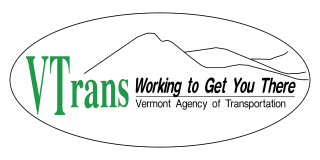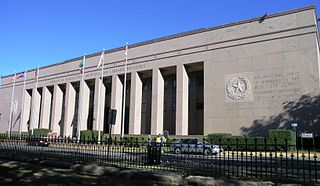
The Federal Communications Commission (FCC) is an independent agency of the United States federal government that regulates communications by radio, television, wire, satellite, and cable across the United States. The FCC maintains jurisdiction over the areas of broadband access, fair competition, radio frequency use, media responsibility, public safety, and homeland security.

The National Telecommunications and Information Administration (NTIA) is an agency of the United States Department of Commerce that serves as the President's principal adviser on telecommunications policies pertaining to the United States' economic and technological advancement and to regulation of the telecommunications industry.
Public-access television is traditionally a form of non-commercial mass media where the general public can create content television programming which is narrowcast through cable television specialty channels. Public-access television was created in the United States between 1969 and 1971 by the Federal Communications Commission (FCC), under Chairman Dean Burch, based on pioneering work and advocacy of George Stoney, Red Burns, and Sidney Dean.
West Virginia Public Broadcasting (WVPB) is the public television and radio state network serving the U.S. state of West Virginia. It is owned by the West Virginia Public Broadcasting Authority, an agency of the state government that holds the licenses for all Public Broadcasting Service (PBS) and National Public Radio (NPR) member stations licensed in West Virginia. It is headquartered in Charleston with studios in Morgantown and Beckley.

The New Jersey Network (NJN) was a network of public television and radio stations serving the U.S. state of New Jersey. NJN was a member of the Public Broadcasting Service (PBS) for television and the National Public Radio (NPR) for radio, broadcasting their programming as well as producing and broadcasting their own programming, mostly relating to issues in New Jersey. With studios in both Trenton and Newark, NJN's television network covered all of New Jersey, plus parts of Pennsylvania, New York, Connecticut and Delaware. The radio network primarily served several areas of New Jersey that were not covered by Philadelphia and New York City public radio stations.

The Constitution of the Commonwealth of Virginia is the document that defines and limits the powers of the state government and the basic rights of the citizens of the Commonwealth of Virginia. Like all other state constitutions, it is supreme over Virginia's laws and acts of government, though it may be superseded by the United States Constitution and U.S. federal law as per the Supremacy Clause.

South Carolina Educational Television is a state network of PBS member television stations serving the U.S. state of South Carolina. It is operated by the South Carolina Educational Television Commission, an agency of the state government which holds the licenses for all of the PBS member stations licensed in the state. The broadcast signals of the eleven television stations cover almost all of the state, as well as parts of North Carolina and Georgia.

The Vermont Agency of Transportation (VTrans) is a government agency of the state of Vermont that is responsible for planning, constructing, and maintaining a variety of transportation infrastructure in the state. This includes roads, bridges, state-owned railroads, airports, park and ride facilities, bicycle facilities, pedestrian paths, public transportation facilities and services, and Department of Motor Vehicles operations and motor carrier enforcement.
Municipal broadband is broadband Internet access owned by public entities. Services are often provided either fully or partially by local governments to residents within certain areas or jurisdictions. Common connection technologies include unlicensed wireless, licensed wireless, and fiber optic cable. Many cities that previously deployed Wi-Fi based solutions, like Comcast and Charter Spectrum, are switching to municipal broadband. Municipal fiber-to-the-home networks are becoming more prominent because of increased demand for modern audio and video applications, which are increasing bandwidth requirements by 40% per year. Supporters of municipal broadband argue that when cities create their own internet and broadband, customers ultimately get faster internet speeds, lower prices, and better customer service than from internet service providers. The purpose of municipal broadband is to provide internet access to those who cannot afford internet from internet service providers and local governments are increasingly investing in said services for their communities.

The California Public Utilities Commission is a regulatory agency that regulates privately owned public utilities in the state of California, including electric power, telecommunications, natural gas and water companies. In addition, the CPUC regulates common carriers, including household goods movers, passenger transportation companies such as limousine services, and rail crossing safety. The CPUC has headquarters in the Civic Center district of San Francisco, and field offices in Los Angeles and Sacramento.

The Texas State Library and Archives Commission (TSLAC) refers to the agency in the state of Texas that assists the people of Texas to effectively use information, archival resources, public records and library materials to improve their lives, the lives of their families, and their communities. The agency is charged with overseeing statewide library programs, meeting the reading-related needs of Texans with disabilities, and preserving and providing access to significant Texas documents.

The Oklahoma Department of Libraries (ODL) is a department of the state of Oklahoma and serves as the official state library for the state of Oklahoma. ODL provides information services and management to the state, assists local public libraries, and coordinates statewide library and information technology projects.

The Constitution of the State of West Virginia is the supreme law of the U.S. state of West Virginia. It expresses the rights of the state's citizens and provides the framework for the organization of law and government. West Virginia is governed under its second and current constitution, which dates from 1872. The document includes fourteen articles and several amendments.
The West Virginia Department of Transportation (WVDOT) is the state agency responsible for transportation in West Virginia. The Department of Transportation serves an umbrella organization for four subsidiary agencies which are directly responsible for different areas of the state's infrastructure.

Arkansas State Library is a special library which operates as a state agency under the Arkansas Department of Education, within Arkansas state government. It provides information resources for state agencies, legislators and legislative staffs. It also provides guidance and support for the development of local public libraries, and library services. Finally, the ASL provides resources, services, and leadership for the educational, informational and cultural needs of Arkansas citizens.
The copyright status of works produced by the governments of states, territories, and municipalities in the United States varies. Copyright law is federal in the United States. Federal law expressly denies U.S. copyright protection to two types of government works: works of the U.S. federal government itself, and all edicts of any government regardless of level or whether or not foreign. Other than addressing these "edicts of government", U.S. federal law does not address copyrights of U.S. state and local government.
Libraries have been in West Virginia for much of its history as a state. Starting with subscription libraries, the early 19th century saw the beginning of libraries formed in many of the large towns. Three Carnegie libraries were built in the state at the beginning of the 20th century.

The South Carolina State Library (SCSL) is the official State Library of South Carolina located in Columbia, South Carolina. It is both a library and a state agency. The SCSL manages public library development, federal and state funding for libraries, service for print-disabled and physically handicapped patrons, library service for state institutions, and library service to state government agencies.












